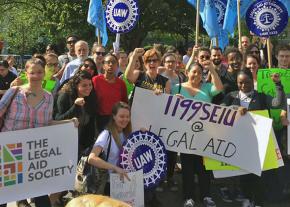Making May Day matter at work
, a member of 1199SEIU and a paralegal with the Legal Aid Society in New York City, describes building for May Day at her workplace.
FOR THE first time in my years as a union activist, I spent May Day as part of a contingent made up of my own co-workers at the Legal Aid Society, who came together to show our support for immigrant rights and workers' rights at a rally at the aptly named Union Square. In the process, I got to talk to many of them about the significance of May Day for them and why they had come out.
"I'm here because I'm from the immigrant families who helped build this country," explained our colleague Carmen Gerardo, a paralegal who does re-entry work with city inmates. "I'm also here because my grandparents, my father, my uncles, they were all union workers. It's about carrying on the tradition but also believing in unions, how they've affected this country and how they've helped empower communities and people."
The contingent was one of the first joint political actions in many years to bring together members of our two sister unions at Legal Aid: the Association of Legal Aid Attorneys, UAW Local 2325 (ALAA), and 1199SEIU, which represents clerical workers, paralegals and social workers.

The word on everyone's lips was solidarity.
"Solidarity for me," explained housing attorney Robert Soriano, "means that regardless of what affinity group or cause you align with, whether it's the Women's March or for migrant workers or the labor movement, we're all on the side of progress, and it's my responsibility to be present."
As the largest provider of criminal and civil legal services in the country, the Legal Aid Society and its unions have a particular role to play in speaking out for and defending the rights of all New Yorkers.
ALAA member Nefertiti Ankra took the mic at the rally to call for more thorough and unqualified support from Mayor Bill de Blasio for undocumented New Yorkers. While the city has announced that it will provide $16 million for legal defense for immigrants, Ankra called out de Blasio for cynically excluding immigrants with certain criminal convictions, which would disqualify many of the people we work with day in and out.
Legal Aid workers are on the front lines of defending working-class and low-income communities, from immigration, to housing and criminal court. But as part of working-class New York, we've also seen our own living conditions deteriorate, especially since the economic crisis of 2008.
"We're in the midst of negotiating a contract, if you can call it that," said 26-year-veteran criminal defense paralegal Joyce Couvares. "We went five years without a raise, and it's hard for Legal Aid staff to exist anymore. I think unions are under attack, and working people have been ignored and abandoned by both parties, and it just can't continue to go on."
"I think we have the same struggle," my co-worker Deanna Perry added. "We're fighting for solidarity for ourselves. We're fighting for fair rates of pay. It's kind of like we're being forgotten, just like most of the immigrant workers are being forgotten."
OUR MAY Day mobilization was the result of more than a month of organizing.
In certain offices, we created May Day committees, held informational lunchtime meetings on the history of May Day and gathered to make posters in the days leading up to the rally. We got to talk about how immigration laws divide workers--how corporations want immigrants here, but want them to be second-class citizens to limit their ability and confidence to organize and fight for better wages.
As my colleague Peter Day put it, employers have always sought to divide workers to create cheaper labor pools: "The ways in which undocumented immigrants are exploited for their labor is one way. The ways in which paralegals are made to do the work of attorneys and underpaid for it is a less extreme but similar example of this same process."
Our preparations for May Day also gave us an opportunity to talk about how we can organize around our own demands.
As my union delegate and coworker Zulay Oyarvide told me, "I'm here to take advantage of a longstanding tradition to honor workers rights, to further fight for immigrant rights, especially given the administration we're dealing with, but I'm also here to assist people starting to get used to getting organized and really advocating for themselves in the time we're in."
Indeed, organizing for May Day is part of politicizing our union work and raising our sights on what is possible.
"The communication and cooperation that we see here today is something that we definitely need to bring back [into the our workplace]," said paralegal Anna Sherman-Weiss.
"I think people need to understand that they have power in themselves, and if individuals have power, imagine the power of a bunch of individuals who come together," added attorney Shivani Alamo.
We hope to bring the spirit of May Day back into our offices to talk about how we can continue to organize for a fair contract, a stronger labor movement and justice for all working-class people, regardless of where they were born or how they got here.


